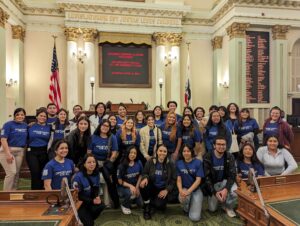UCLA Labor Center and APALA Launch 2022 Racial Justice Workshop Summer Series
On Wednesday, July 6th, the UCLA Labor Center and the Asian Pacific American Labor Alliance (APALA) co-hosted the first out of five workshops from the 2022 Racial Justice Workshop Series, a campaign continuing through July and August.
The inaugural workshop, “Racial Justice,” featured guest speakers Ligaya Domingo (SEIU Healthcare 1199 NW), Monica Thammarath (California Teachers Association – CTA), and Kim Geron (California Faculty Association) who offered unique insights into the intersections of anti-racism education and organizing for AAPI and immigrant workers’ rights.
Kent Wong, UCLA Labor Center Director and Founding President of APALA, opened the workshop with critical historical context into the AAPI labor movement. Wong noted AAPI workers’ integral 170-year presence in the U.S. economy, a presence that has been met with systemic discrimination, economic disparities, and a lack of career advancement opportunities.
Guest speaker Ligaya Domingo reiterated that displays of anti-Asian violence need to be contextualized within the historical othering of Asians in the US as the “perpetual foreigner.” This othering also plays a part in devaluing AAPI workers. Early labor movements intensely denied the ties between racial inequity and economic inequality, highlighting the importance of building actively anti-racist labor unions. Domingo explained, “When you apply the history of race, you see the ways it has impacted [working people] differently,” making it essential to forge alliances with other workers of color to organize in different ways in order to achieve what each community needs.
Within teacher unions, Monica Thammarath reported there was initial resistance in advocating for ethnic studies education in K-12 schools. However, through organizing from the bottom-up, members powerfully mobilized for their communities’ and students’ need for anti-racist education. Union members’ collective persistence in asserting the importance of ethnic studies laid the foundation for CTA to begin co-sponsoring and lobbying for the integration of ethnic studies, critical race theory, and safe spaces in classrooms—which served as a breakthrough in developing education with an anti-racist framework.
Similarly, Kim Geron commended San Francisco State University’s inaugural implementation of Asian American Studies in the 1970s, an effort pioneered by students of color. Building on this legacy, student activists have worked with progressive legislators to demand every publicly-funded California university and community college require an ethnic studies class as a graduation requirement. Expanding the educational curriculum to include ethnic studies for the next generation can lead to stronger and more informed organizing in multicultural coalitions.
APALA’s commitment to advancing racial justice education was strongly renewed following the Black Lives Matter resurgence in 2020. Historically, African American leadership in the Civil Rights Movement inspired AAPI activists in their fight to expel AAPI exclusionary immigration policies, leading to the Immigration Act of 1965. Thus, part of fighting for AAPI and immigrant workers’ rights includes centering Black lives and taking action to acknowledge and address anti-Blackness in AAPI communities.
Ultimately, this workshop highlighted the solidarity AAPI workers and other communities of color have between shared experiences with economic and racial injustice to long histories of organizing for meaningful social change. One key element of that change is incorporating anti-racism education into dialogue among labor unions and school curriculums. This Racial Justice workshop served as a reminder that, as one participant noted, “many movements that have uplifted the lives of a particular group of people have intersected with the struggles of others.”
The next workshop will continue where our conversation left off, with a focus on Organizing. Click here to RSVP for future workshops.
If you have any questions about these workshops, please contact EmpoweringAPI@gmail.com


